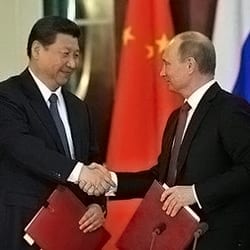Pundits have long decried the May 2014 Sino-Russian energy deal as a union of enemies, ushering in a new anti-American coalition. The deal is expected to move as much as 38 billion cubic meters of gas to China between 2018 and 2047, with a total value of some $400 billion. Yet recent research continues to suggest that not all bodes ill. The Chinese most likely simply sought to serve their growing domestic energy needs, but to do so in a way that improves air quality and helps them move away from coal. The goal was simple: to better the quality of life for millions of Chinese through investment in cleaner energy. But China’s good relationship with Russia may have led to another, far more important development: Russian consent to the Iranian nuclear deal.
While still speculative, many signs point to this truth. Russia has been increasingly isolated since the crisis in Ukraine. Europe’s subsequent move away from Russian energy dealt a crippling blow to what was an already-hurting economy under Putin. Turning away from the West, Russian naturally found a buyer in China. However, China held significant leverage in negotiations with Russia, with the price of oil dropping lower by the day and Russian state-run energy companies quickly going broke. The estimated $55 billion cost will fall largely on the Chinese. In exchange for shouldering more of the financial burden in pipeline construction, the Chinese may have asked the Russians to sign on to a nuclear deal with Iran.
But why would the Chinese want the Russians to push for an Iranian nuclear deal with the West? Of course, we do not know what goes on behind the doors of the Kremlin or Zhongnanhai in Beijing. Nevertheless, the answer points towards energy. Recently, China has been subsisting largely on oil from Saudi Arabia and other Gulf states; in 2014, crude oil imports from these countries accounted for more than a third of total Chinese consumption. However, the return of Iranian oil to international markets may help the Chinese in two ways. First, it offers an increased supply to the energy-hungry behemoth that is the Chinese fleet of enterprises. But more than that, it is likely to force the price of oil even lower. With Iran and Saudi Arabia competing for Chinese business, the Chinese are likely to find the leverage to extract more favorable pricing.
Currently, it seems the Russians are hoping the deal with China may offset any revenue lost due to lower oil prices. The Russians are happy to have a customer for their gas exports, given increasing uncertainty in doing business with European countries unhappy with Russia’s actions in Ukraine and elsewhere. However, the deal generally forecasts unfavorable prospects for future Russian LNG projects, which would require significant involvement from international partners. The main question at this time is: how much will the Chinese invest in the current deal, given the increasing weakness of the Russian position? Only time will tell. In the meantime, the Russia-China energy alliance may have positive, albeit unintentional, outcomes for at least some of the U.S. plans for strengthened security in the Middle East.
Ted Fruchtman is a junior at Rice University majoring in Asian Studies and working as a research assistant on US-China energy relations and Chinese central-local government relations policy research at the China Studies Program at the Baker Institute.
